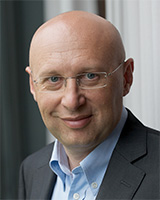Universität Heidelberg Congratulates Stefan Hell on Nobel Prize in Chemistry
8 October 2014
Doctorate and habilitation at Ruperto Carola – physicist’s working group conducts research at BioQuant Centre

Photo: Bernd Schuller
Physicist Prof. Dr. Stefan Hell, Director at the Max Planck Institute for Biophysical Chemistry in Göttingen and a department head at the German Cancer Research Center (DKFZ) in Heidelberg, has been awarded this year’s Nobel Prize in Chemistry. The scientist earned his doctorate and completed his habilitation at Heidelberg University. He is an adjunct professor at Ruperto Carola and a member of the university's CellNetworks Cluster of Excellence. Prof. Hell was awarded the highest distinction in chemistry for his work on the development of ultra-high-resolution fluorescence microscopy beyond the limitations of light. The Royal Swedish Academy of Sciences announced the award on Wednesday, 8 October 2014, in Stockholm. Prof. Hell shares the Nobel Prize, endowed with approx. 880,000 euros, with Dr. Eric Betzig (Howard Hughes Medical Institute in Chevy Chase) and Prof. Dr. William Moerner (Stanford University).
The rector of Heidelberg University, Prof. Dr. Bernhard Eitel, congratulated Prof. Hell on this high honour. “We are proud that an outstanding researcher, who received his scientific education at our university and still maintains close ties to Heidelberg, has been recognised with such a distinction for his research.” Prof. Hell’s work, which inspired the field of nanoscopy, contributed significantly to scientists' ability to see the tiniest structures in the cell, in microorganisms and other biological systems with the use of light. “His technological developments afford entirely new insights into the nanoworld of biological systems that are simply not possible with conventional microscopy,” underscores Prof. Dr. Roland Eils, whose Theoretical Bioinformatics Department is located at Heidelberg University and the DKFZ.
Stefan W. Hell (born 1962) studied physics at Heidelberg University, earning his PhD here in 1990. From 1991 to 1993, he worked at the European Molecular Biology Laboratory (EMBL) in Heidelberg, followed by three and a half years of research positions at the Universities of Turku (Finland) and Oxford (United Kingdom). He completed his habilitation in physics at Heidelberg University in 1996. In 1997, he joined the Max Planck Institute for Biophysical Chemistry in Göttingen as a junior research group leader. Prof. Hell was appointed a Max Planck Director and head of the Department of NanoBiophotonics in 2002. He has headed the Division of Optical Nanoscopy at the DKFZ since 2003, when he was also appointed adjunct professor at Ruperto Carola. His working group conducts research at the BioQuant Centre of Heidelberg University. Stefan Hell has been honoured with numerous prestigious awards, most recently in September 2014 when he shared the Kavli Prize in Nanoscience with two other researchers.

